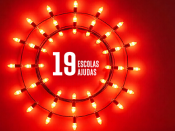Por Ben Stevenson (University of Auckland, New Zealand).
Dynamic Spatial capture-recapture (SCR) models are widely used to estimate animal density and distribution from wildlife surveys. They involve fitting a spatial point process to animal locations, where each location is typically considered to be the centre of an individual’s activity during the survey. One of many complications is that the locations are latent: we are fitting a point process without observing a point pattern. Instead, we observe detection events of animals from an array of detectors, such as physical-capture traps, camera traps, or even microphones. Almost all SCR studies to date have used Poisson processes for animal locations: either a homogeneous process for which animal density is constant over space, or an inhomogeneous process with a log linear relationship between observed spatial covariates and animal density.
In this talk, I will describe how we can use penalised regression splines within an SCR model, which has a few benefits relative to the standard approaches. First, we can fit log-Gaussian Cox processes instead of Poisson processes, allowing us to model spatial variation in density without any observed covariates, or without having to assume that our observed covariates fully describe animal density. Second, we can fit smooth effects of covariates on density instead of making assumptions about the nature of the relationship, akin to fitting a generalised additive model rather than a generalised linear model.
This talk will include crash-courses in both spatial statistics and in capturerecapture, so feel free to come along even if these topics are unfamiliar to you.
Short bio: Ben Stevenson is a Senior Lecturer in the Department of Statistics at the University of Auckland, New Zealand. An alumnus of the same institution, earned both a BSc (Hons) and an MSc before pursuing a PhD at the University of St Andrews, United Kingdom, graduating in 2016. Joined the University of Auckland’s faculty in January 2017. His research primarily focuses on developing statistical methods and software aimed at estimating ecological parameters, often concerning animal abundance or density. His expertise also extends to spatial statistics, statistical computing, and applied statistics, with a strong emphasis on ecological applications. His interdisciplinary research interests have also led to contributions in medicine and veterinary sciences.
Transmissão por Zoom.













